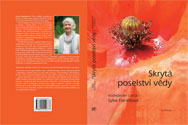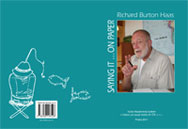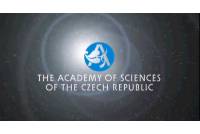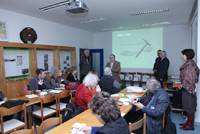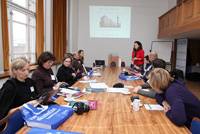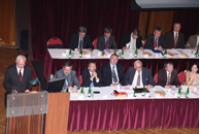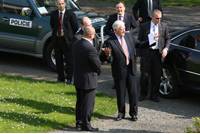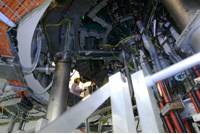EUCYS 2013 in Prague
2 Aug 2013
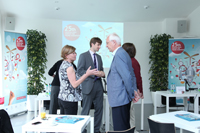 Academy of Sciences of the Czech Republic will be hosting the 25th edition of the European Union Contest for Young Scientists (EUCYS) which will take place in Prague from 20 until 25 September. The event is an annual exhibition of the finest work developed by young scientists in many different scientific fields; it enables the best young minds of different countries to compare ideas and admire each other’s work, as well as to compete with one another at European level. European Union Contest for Young Scientists is an initiative of the European Commission that was set up in 1989 with the goal of promoting cooperation and interchange between young scientists and guiding them towards a future career in science and technology. More information on http://www.eucys2013.cz.
Academy of Sciences of the Czech Republic will be hosting the 25th edition of the European Union Contest for Young Scientists (EUCYS) which will take place in Prague from 20 until 25 September. The event is an annual exhibition of the finest work developed by young scientists in many different scientific fields; it enables the best young minds of different countries to compare ideas and admire each other’s work, as well as to compete with one another at European level. European Union Contest for Young Scientists is an initiative of the European Commission that was set up in 1989 with the goal of promoting cooperation and interchange between young scientists and guiding them towards a future career in science and technology. More information on http://www.eucys2013.cz.
Czech physicists contributed to the discovery of new mechanisms for storing information
17 Jul 2013
The Spintronics and Nanoelectronics group from the Institute of Physics, Academy of Sciences of the Czech Republic has completed another successful research project which opens new oportunities for future information technologies. The work which discovers and explains the origin of a new mechanism that allows to electrically control the velocity of domain walls driven across the magnetic medium was performed within the long term collaboration in spintronics research with groups from Cambridge and Nottingham in the UK. It was published on June 9, 2013 in the journal Nature Materials.
FGMT 2013
16 Jul 2013
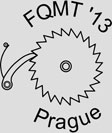 The Institute of Physics, the Academy of Sciences of the Czech Republic organizes the international conference that will take place in Prague on 29 July–3 August, 2013. Its main goal is to contribute to uncovering possible phenomenological (“quantum thermodynamic”) laws governing the behavior of mesoscopic systems and also to provide better understanding and insight into recent problems of the foundations, relying on theoretical and experimental methods of condensed matter physics and quantum optics. Special attention will be given to the dynamics of mesoscopic open systems and their relevance to problems of measurement of non-equilibrium quantum systems, thermal and quantum fluctuations, dissipation, noise, physics of quantum information and biological systems, in terms of both theory and experiment. FQMT’13 is follow-up to three previous conferences held in Prague 2004, 2008 and 2011. The FQMT'13 program will feature concerts of classical and jazz music performed by world-class musicians, held at outstanding venues of the city. Both the scientific program and the musical program are intended as a complement to one another, where scientists and musicians are encouraged to mingle and share their knowledge and experience. More information on http://fqmt.fzu.cz/13/.
The Institute of Physics, the Academy of Sciences of the Czech Republic organizes the international conference that will take place in Prague on 29 July–3 August, 2013. Its main goal is to contribute to uncovering possible phenomenological (“quantum thermodynamic”) laws governing the behavior of mesoscopic systems and also to provide better understanding and insight into recent problems of the foundations, relying on theoretical and experimental methods of condensed matter physics and quantum optics. Special attention will be given to the dynamics of mesoscopic open systems and their relevance to problems of measurement of non-equilibrium quantum systems, thermal and quantum fluctuations, dissipation, noise, physics of quantum information and biological systems, in terms of both theory and experiment. FQMT’13 is follow-up to three previous conferences held in Prague 2004, 2008 and 2011. The FQMT'13 program will feature concerts of classical and jazz music performed by world-class musicians, held at outstanding venues of the city. Both the scientific program and the musical program are intended as a complement to one another, where scientists and musicians are encouraged to mingle and share their knowledge and experience. More information on http://fqmt.fzu.cz/13/.
Feeding Galaxy Caught in Distant Searchlight
8 Jul 2013
To ESOF 2014 by bus
4 Jul 2013
Euroscience and the ESOF local organizers that provide young researchers with a unique opportunity to interact with leading scientists from various scientific fields wish to encourage and promote the participation of groups of graduate and PhD candidates. The groups will reach Copenhagen in Denmark (the next host of ESOF in 2014) by bus (ideally a low emission vehicle) or some other low cost transportation. Selected participants will have access to all ESOF 2014 programmes and to the specific sessions dedicated to Young Researchers. This project is based on the successful Barcelona and Torino Science Bus event, realized by the ESOF2008 and ESOF2010 Team that brought to Barcelona 40 and to Torino 30 students. The Science busses participants will be offered a very low conference fee (80€), the possibility to be hosted in low cost accommodations in Copenhagen and onsite help provided by the local organisers.
International Workshop in Ceske Budejovice
4 Jul 2013
Researchers, students, and interested public are invited to a 1-day workshop Plant-insect food webs along latitudinal and altitudinal gradients originating from lowland tropical rainforests bringing to Ceske Budejovice some of the leading scientists in ecology. The workshop will include oral presentation by 18 senior on biodiversity along ecological gradients, followed by an open poster session where you can present your own poster, and a general discussion with refreshments.
Russian scientists defend their Academy of Sciences
3 Jul 2013
Russian scientists and their foreign colleagues raise the alarm about the new law, that is about to radically transform the almost 300-years old Russian academy of sciences. It should be merged with two more specialized bodies – the Russian Academy of Agricultural Sciences and the Russian Academy of Medical Sciences. The academy's real estate holdings and property should be managed by the newly established agency. Russian scientists protest against plans to ruin RAS by symbolic funeral of Russian science in the streets of Moscow in a similar way as Czech scientist did in 2009 in order to warn of the intended radical budget reduction of ASCR. President of RAS Vladimír Fortov is to meet with the president Vladimir Putin July 3, 2013, the same day the new law should be debated in Russia's parliament. The well-known scientists from all over the world draw the attention to the seriousness of situation in many open letters.
Russian scientists plan to protest daily at different places of Moscow.
Names for New Pluto Moons
3 Jul 2013
 The International Astronomical Union (IAU) is announcing that the names Kerberos and Styx have officially been recognised for the fourth and fifth moons of Pluto, which were discovered in 2011 and 2012. The names were submitted to the IAU by the leader of the team responsible for the discovery, who had called for the help of the general public in an open contest that attracted a substantial number of participants. More information on http://www.iau.org/public_press/news/detail/iau1303/.
The International Astronomical Union (IAU) is announcing that the names Kerberos and Styx have officially been recognised for the fourth and fifth moons of Pluto, which were discovered in 2011 and 2012. The names were submitted to the IAU by the leader of the team responsible for the discovery, who had called for the help of the general public in an open contest that attracted a substantial number of participants. More information on http://www.iau.org/public_press/news/detail/iau1303/.Atmospheric station in Křešín by Pacov
2 Jul 2013
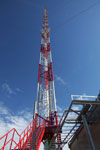 The Network of atmospheric stations within the European Research Infrastructure ICOS has welcomed a new member. An atmospheric station in Křešín by Pacov in the Bohemian – Moravian Highlands was launched June 17, 2013 on the occasion of observing the 25th anniversary of the global environmental observatory in Košetice. The stations have been consolidated and it is a major research and monitoring infrastructure in the Czech Republic and Central Europe. It consists of two components – the observatory at Košetice, operated since 1988 by the Czech Hydrometeorological Institute and the atmospheric station Křešín by Pacov, which began operations in June of this year. The atmospheric station was built and is administered by CzechGlobe, the Global Change Research Centre of the ASCR, and is situated 100 meters from the observatory.
The Network of atmospheric stations within the European Research Infrastructure ICOS has welcomed a new member. An atmospheric station in Křešín by Pacov in the Bohemian – Moravian Highlands was launched June 17, 2013 on the occasion of observing the 25th anniversary of the global environmental observatory in Košetice. The stations have been consolidated and it is a major research and monitoring infrastructure in the Czech Republic and Central Europe. It consists of two components – the observatory at Košetice, operated since 1988 by the Czech Hydrometeorological Institute and the atmospheric station Křešín by Pacov, which began operations in June of this year. The atmospheric station was built and is administered by CzechGlobe, the Global Change Research Centre of the ASCR, and is situated 100 meters from the observatory.
Russian Academy of Sciences threatened by new law
1 Jul 2013
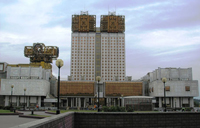 Russian science journalists inform at various web portals about the new law that is about to radically transform the almost 300-years old RAS. The mentioned law should be adopted without a previous discussion with the scientific community in fast-track debate in Russia's parliament. This news comes only a month after the new reform-minded physicist Vladimír Fortov was elected RAS president. According to the Russian Prime Minister Dmitry Medvedev who was speaking to the RIA Novosti news agency the new law and its outcome will enable scientists “to concentrate on research and will spare them the irrelevant function of managing”.
Russian science journalists inform at various web portals about the new law that is about to radically transform the almost 300-years old RAS. The mentioned law should be adopted without a previous discussion with the scientific community in fast-track debate in Russia's parliament. This news comes only a month after the new reform-minded physicist Vladimír Fortov was elected RAS president. According to the Russian Prime Minister Dmitry Medvedev who was speaking to the RIA Novosti news agency the new law and its outcome will enable scientists “to concentrate on research and will spare them the irrelevant function of managing”.
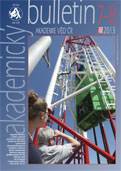

 Česky
Česky


